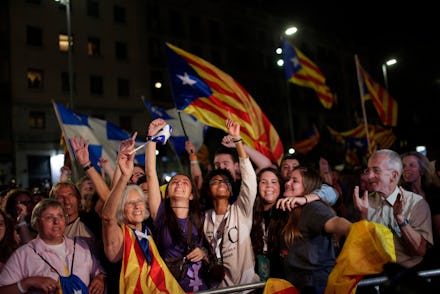Catalonia Just Voted for Independence After 300 Years Under Spanish Control

The regional assembly of Catalonia, located in northeastern Spain, voted in favor of a secession plan on Monday, which seeks to phase in independence over the course of 18 months.
In Barcelona, the chamber voted to pass the motion, with 72 votes in favor and 63 against, during the first parliamentary session since September's regional elections.
The secession campaign was spearheaded by Popular Unity Candidacy, a far left-wing political party in favor of secession, and the Junts pel Sí (Together for Yes) alliance of lawmaker separatists; the two parties combined won a parliamentary majority in September.
The resolution declared it was "the start of a process toward the creation of an independent Catalan state in the form of a republic" and a "process of democratic disconnection not subject to the decisions by the institutions of the Spanish state," according to the Associated Press.
Spanish Prime Minister Mariano Rajoy and the country's center-right government have pledged to block any attempts at secession. The Guardian reported Rajoy has previously said he would appeal to the Constitutional Court to deem the resolution invalid. An appeal would freeze the motion and a trial would commence, whereby a judge would ultimately make the decision as to its legality.
A split Spain: "What I think is that the situation went out of control," Andrea Rodés, a Catalan journalist and author, told Mic. Rodés is writing a book on the Catalan refugees who fled after the 1714 Spanish siege, which resulted in the end of Catalonia's constitutional independence; the year 1714 has become a significant symbol for Catalan nationalists.
"I understand that many Spaniards have had a bellyful ... of this continued attempt to delegitimize our institutions," Rajoy said, Reuters reported.
"There is one technical thing: Can they go on their own for independence if they won the elections with only around 51% [of the votes]?" Rodés asked. "It's an absolute majority [in parliament], but it's a split country. For me, it's not a smart decision."
The Popular Unity Candidacy and Junts pel Sí won an outright majority with 72 seats (they needed 68 for a parliamentary majority) but together accounted for only 47.7% of the votes in the September elections.
Hubbub in the hodgepodge: "Maybe 50% of the Catalan population — I don't know exactly the proportion — but their origins are not Catalan," Rodés told Mic. "In the '60s there were a lot of immigrants from all parts Spain that moved to Catalonia, because we were a richer country and more industrially advanced. So, Catalonia, it was a mix of Spanish culture and Catalan culture — it was a melting pot that works."
According to Rodés, however, some of her Catalan friends feel as though their people have been oppressed by Spain for hundreds of years, particularly under the dictatorship of Francisco Franco.
But Franco's dictatorship applied to the country in its entirety. Furthermore, there was a "failure (or unwillingness) to oppose Franco in the 1940s" by "conservative, Catholic and bourgeois sectors" in Catalonia, Andrew Dowling explains in his book, Catalonia Since the Spanish Civil War: Reconstructing the Nation. Franco's regime at one time seemed economically advantageous to industrialists.
Rodés also argued that Rajoy is objecting to the secession for the sake of gaining votes in upcoming general elections on Dec. 20. He won't get votes in Catalonia anyway, she said, so objecting to independence could help him gain votes in the rest of the country.
A costly divorce: Aside from becoming a politically expedient issue, secession could have economic ramifications for the rest of the country. "Catalonia is one of Spain's richest and most highly industrialized regions," the BBC notes.
"A move for Catalan independence could throw the EU into a new political crisis and create havoc for the Spanish economy, which is only just emerging from a long downturn," the Telegraph wrote in the run up to the regional elections.
Yet pro-independence Catalans say their region does not get equal or sufficient returns from the federal government, given how much it takes in taxes from Catalonia.
The federal government could potentially offer the region greater economic autonomy as a compromise, Rodés suggested. "I don't think a solution for anything is becoming independent in the middle of the 21st century," she concluded. "I think it makes no sense and our relationship with Spain is very long and we can [find a way to] get on very well."